Crypto World
Minnesota to Weigh Ban on Crypto Kiosks after Scam Reports
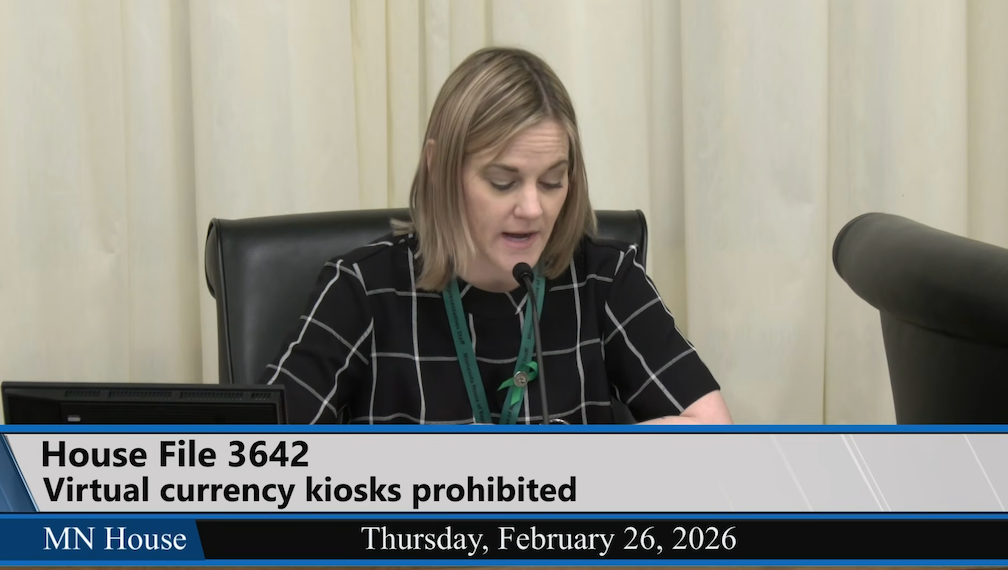
A Minnesota lawmaker has introduced a bill that could ban virtual currency kiosks across the state after reports of incidents involving crypto-related scams.
In a Thursday session of the Minnesota House of Representatives Commerce Finance and Policy Committee, Representative Erin Koegel said the bill, House File 3642, would address the “novel” and “minimally regulated” technology of crypto kiosks.
Koegel said she had heard from state law enforcement agencies that many scammers used the kiosks to trick residents into sending crypto, while legitimate traders tended to use centralized exchanges.
“Because of the nature of cryptocurrency, these fraudulent transactions are often irreversible and incredibly hard to track,” said Koegel, adding:
“This bill gives us an opportunity to work across party lines to protect the people of Minnesota from irreversible financial crimes.”

Minnesota’s government already passed a law in 2024 attempting to fight scammers using the state’s virtual currency kiosks. The law set a $2,000 deposit limit for new kiosk users and required companies to issue full refunds for fraud victims. However, Koegel’s bill, if passed, could fully ban the technology in Minnesota.
“Within the past couple of years, we’ve definitely identified an issue with these Bitcoin ATMs, specifically in our jurisdiction,” said Sergeant Jake Lanz of the St. Cloud Police Department at the Thursday committee meeting. “[…] it also is notable for us that it is definitely a target of our aging population.”
Related: US senators to weigh CFTC, other amendments to crypto market structure bill
According to the House, Minnesota has about 350 licensed crypto kiosks operated by several companies, including Bitcoin Depot and Coinflip. The American Association of Retired Persons reported in February that 17 states had laws on the books requiring crypto ATM operators to implement protections against fraudsters, such as setting daily transaction limits and requiring fraud warning signs.
Bitcoin ATM operator to require IDs for all transactions
On Tuesday, Bitcoin Depot, one of the largest crypto ATM operators in the US, announced that it would implement a policy requiring ID verification for users with every transaction at one of its machines. The phased rollout, which began in February, was in response to “potential misuse,” though the company did not specifically mention state-level crackdowns on scammers.
Magazine: Would Bitcoin really be at $200K if not for Jane Street? Trade Secrets
Crypto World
US Bank With 14 Million Users Just Turned Bullish On Solana

Major US Bank SoFi now supports Solana network deposits. This means 13.7 million users of the bank can send SOL directly to their SoFi crypto accounts from external wallets.
The US-chartered bank announced the update on X, stating users can buy, sell and hold SOL inside the SoFi app.
Major Solana Access For US Banking Customers
In practice, SoFi is enabling direct on-chain deposits for a major public blockchain within a regulated national bank. Users can manage balances alongside checking, savings and other financial products in a single interface.
The move expands SoFi’s digital asset offering beyond simple brokerage-style exposure. It connects a traditional bank charter with a live blockchain network, which remains rare among nationally chartered US banks.
An Important US Access for Solana
SoFi began as a student loan refinancing platform in 2011 and later secured a national bank charter. It has grown into a mid-sized US bank with more than $50 billion in assets and tens of billions in deposits.
While far smaller than Wall Street giants, it ranks among the larger digital-first banks in the country.
The company’s brand extends beyond finance. SoFi holds naming rights to SoFi Stadium in Inglewood, California.
The venue hosted Super Bowl LVI in 2022 and WrestleMania 39 in 2023. It is also scheduled to host multiple matches during the 2026 FIFA World Cup and will play a central role in the 2028 Los Angeles Olympics.
Against that backdrop, adding Solana deposits signals deeper integration between US banking infrastructure and public blockchains.
It allows regulated bank customers to move assets directly on-chain while staying inside a traditional banking framework.
Crypto World
XRP Price Fell 40%, But Strong Holders Loaded 200% More
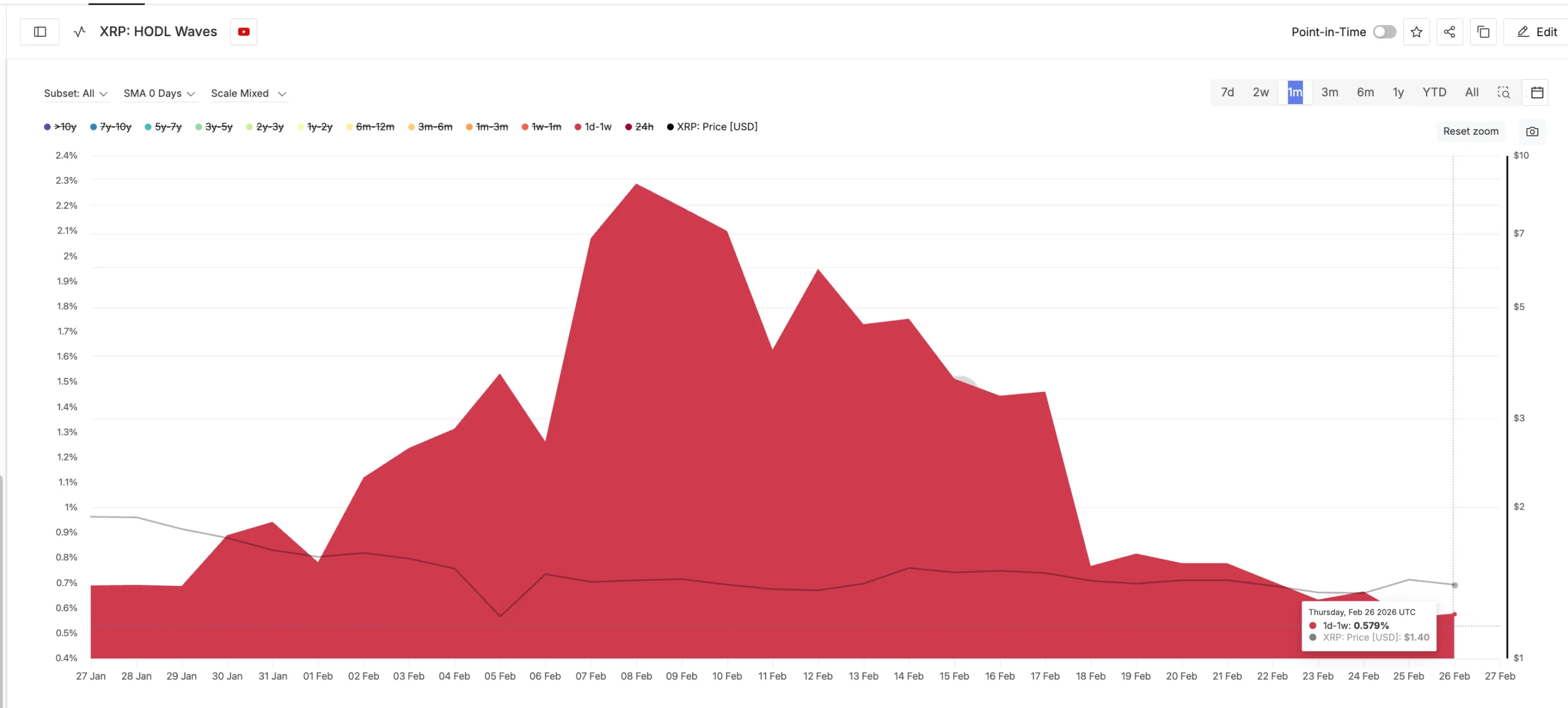
XRP price has fallen nearly 40% since January 5, dropping from $2.35 to around $1.40. Moves of this size usually trigger panic selling and long-term damage to market structure. But this time, something very different happened.
Instead of accelerating the decline, one holder group stayed calm, while another, less enterprising, group quietly left. At the same time, leverage remained balanced and institutional flows stayed positive. Together, these signals suggest XRP’s crash may have strengthened its foundation rather than broken it.
Speculative Holders Collapsed — Removing the Biggest Source of Selling Pressure
One of the most important changes during XRP’s decline was the exit of speculative holders, as measured by the HODL Waves metric, which segments cohorts by time. These are short-term traders who typically hold for one day to one week and tend to sell quickly during volatility.
On February 8, these short-term holders controlled 2.29% of XRP’s total supply. By February 26, that figure had fallen sharply to just 0.579%. This represents a 74.7% decline in speculative supply share in less than three weeks. All while the price declined.

Want more token insights like this? Sign up for Editor Harsh Notariya’s Daily Crypto Newsletter here.
This kind of flush is important because speculative holders often create continuous selling pressure during rebounds. Their exit removes an unstable supply, allowing the price to stabilize. In simple terms, weak hands have already left. This reduces the risk of panic-driven crashes during future pullbacks.
But removing weak holders alone does not create strength. The more important question is whether strong holders also stayed.
Long-Term Holders Held Firm, Even as XRP Price Lost 40%
While XRP price collapsed, long-term holders behaved very differently.
The Hodler Net Position Change metric tracks whether investors holding for at least 155 days are buying or selling over a 30-day period. These holders are often considered the most informed participants because they typically accumulate during weak markets.
On January 5, when XRP traded near $2.35, long-term holders had added around 47.3 million XRP on a rolling monthly basis. By February 26, after XRP had dropped to around $1.40 (a 40% dip), their net position change had risen dramatically to approximately 145.45 million XRP, a 200% rise.
This means the largest and most patient holders increased exposure while price collapsed — the exact opposite of panic behavior.
More importantly, since mid-February, their holdings have remained steady even as XRP fluctuated between $1.21 and $1.52. They did not reduce exposure during volatility. This stability sends a strong signal. It suggests that the investors with the highest conviction are not treating the crash as a reason to exit. Instead, they appear to be positioning for future recovery.
This creates a stronger holder base. But price stability also depends heavily on derivatives positioning.
XRP’s Balanced Leverage Weakens The Biggest Crash Risk
One of the main reasons crypto crashes accelerate is excessive leverage imbalance. When too many traders take the same position, forced liquidations amplify price moves.
Ethereum currently shows this risk clearly. On Binance’s ETH/USDT perpetual contracts, long leverage stands near $976 million compared to $576 million in shorts. This creates heavy downside liquidation risk if the price falls.
XRP’s positioning looks very different.
On Binance, XRP’s perpetual contracts show approximately $74.93 million in long leverage and $69.14 million in short leverage. This is almost perfectly balanced, in the same timeframe as ETH.
This balance is important. It means XRP does not have a large cluster of overleveraged buyers that could be wiped out during a drop. At the same time, it also avoids overcrowded short positioning that could destabilize the price.
Balanced leverage creates a healthier structure. It allows price to move based more on real demand instead of forced liquidations. This healthier positioning is also appearing in institutional flows and technical structure.
Institutional Flows and XRP Price Structure Now Open the Path Toward $1.70
While many major crypto assets experienced weak ETF demand in February, XRP-related investment products continued attracting steady inflows. This shows institutional participation did not collapse during XRP’s decline. There were no major net outflow weeks recorded in XRP-linked investment products
Institutional inflows are important because they represent longer-term capital. Unlike speculative traders, institutions do not usually react to short-term volatility. Their steady participation helps stabilize markets during uncertain periods.
Combined with strong holder behavior and balanced leverage, this strengthens XRP’s recovery foundation. These structural improvements are now aligning with a key technical setup.
On the 8-hour chart, XRP appears to be forming a cup-and-handle pattern. This is a bullish continuation structure that often appears before upward breakouts. The handle formed after XRP corrected about 7% from its recent February 25 high, creating a consolidation zone.
This structure now defines the key levels ahead. If XRP holds above $1.38, the bullish structure remains intact. A drop below this level would weaken momentum.
A move below $1.31 would invalidate the bullish pattern completely. On the upside, XRP must first break above $1.42 to confirm the handle breakout. The more important breakout level sits at $1.52, which sits near the neckline of the cup-and-handle pattern.
If XRP breaks above $1.52, the technical projection points toward approximately $1.71 (the $1.70 zone). In stronger breakout scenarios, the move could extend toward $1.86 depending on breakout strength and where the neckline gets breached.
For now, XRP’s crash may have done something unexpected. It may have made the asset structurally stronger rather than weaker.
Crypto World
XRP Price Structure Keeps 900% Upside Target Active

TLDR
- XRP surged 647% from $0.49 to $3.66 after its late 2024 breakout.
- The token now trades near $1.38 following a 70% pullback from its peak.
- Analyst Javon Marks said the $15 measured move target remains unchanged.
- A move to $15 would represent more than 900% upside from current levels.
- XForceGlobal said the current price action reflects compression rather than weakness.
XRP price has returned to focus after its late 2024 breakout triggered a 647% rally to $3.66 by mid 2025. The asset now trades near $1.38 following a 70% pullback from its peak. Analysts state that the original breakout structure still supports a larger upside move.
XRP Price Structure Keeps $15 Measured Move in Play
Javon Marks stated on X that the “$15 measured move target goes unchanged” despite recent volatility. He based his view on the multi-year triangle breakout that occurred in November 2024.
The XRP price surged from $0.49 to $3.66 after the breakout was confirmed. Marks calculated the target by extending the triangle height from the breakout point. He said the structure still supports a 10x move from current levels. From $1.38, a rise to $15 would mark a gain above 1,000%.
Meanwhile, the XRP price has declined by over 38% on a yearly basis. The token also slipped 4.3% in the past 24 hours. However, Marks maintained that price swings do not invalidate the broader breakout setup.
Measured move analysis uses the full height of consolidation patterns. Analysts apply this method after confirmed breakouts. In this case, the late 2024 move remains the reference point.
Analysts Cite Compression Phase After 70% Pullback
Korean Elliott Wave analyst XForceGlobal said, “it’s all coming together” for XRP from a structural view. He pointed to the rally that revisited the prior all-time high zone near $3.66.
He also referenced the retracement back toward the $1 region. According to him, this reset completed two major milestones within the broader wave count. He described the current sideways movement as “compression, not weakness.”
XForceGlobal earlier projected $6 as a conservative Fibonacci extension level. He later referenced $5 and $10 as possible targets within the same wave structure. He stated that short-term volatility does not disrupt the impulsive expansion outlook.
At the same time, XRP has printed five consecutive red monthly candles. This pattern last appeared during the 2016 to 2017 consolidation period.
That earlier stretch preceded a sharp rally in 2017. Current market data also showed over $900 million in realized losses within one week.
Community commentator Archie projected a long-term chart target near $83. He based this outlook on historical breakout extensions and long cycle projections.
An $83 price would imply a multi-trillion-dollar market capitalization. Meanwhile, XRP continues to trade around $1.38 at the time of reporting.
Crypto World
Will crypto market dip as US PPI shows sticky inflation?


The crypto market is facing new pressure after fresh U.S. inflation data showed that price growth is still stubbornly high, raising concerns about tighter financial conditions.
Summary
- January PPI beat forecasts, signaling persistent inflation pressures.
- Bitcoin fell toward $66,000 as rate-cut hopes weakened.
- Analysts warn of more downside if macro data stays hot.
The January 2026 Producer Price Index report from the Bureau of Labor Statistics was released today, Feb. 27. It showed that wholesale inflation was higher than expected, supporting predictions that the Federal Reserve might keep interest rates high for a longer period.
The data arrived at 8:30 a.m. ET and was followed by immediate weakness in equities and digital assets. Bitcoin (BTC) slipped toward the $66,000, while Ethereum (ETH) and major altcoins posted similar declines.
Hot PPI data raises rate fears
The January report showed headline producer prices rising 0.5% month over month, above the 0.3% forecast. On a yearly basis, PPI climbed 2.9%, also exceeding expectations.
Core PPI, which excludes food and energy, rose 0.8% on the month and 3.6% year over year, marking its highest reading in around 10 months. A narrower “super-core” measure increased 0.3% for the third straight month.
Services prices were the main driver. Final demand services jumped 0.8%, the largest gain since July. Trade services margins surged 2.5%, while professional and commercial equipment wholesaling rose 14.4%, a move widely linked to higher import costs tied to tariffs.
In contrast, goods prices fell 0.3%, led by declines in energy and food. Goods outside of those categories did, however, rise by 0.7%, indicating that underlying cost pressures are still very much present.
It was a clear message for investors. Policymakers are finding it more difficult to defend short-term rate cuts as a result of the services sector’s inflation.
Markets have already reduced expectations for easing in early 2026, pushing real yields and the U.S. dollar higher. These conditions typically weigh on risk assets, including cryptocurrencies.
Crypto market reaction and short-term outlook
Financial markets responded quickly to the data. Dow futures dropped more than 400 points at one stage, while Nasdaq futures fell over 1%. Crypto followed the same risk-off pattern.
Within hours of the release, Bitcoin declined about 2% to 3% from pre-report levels. Ethereum and major altcoins tracked the move. At the same time, gold moved higher, reflecting renewed demand for traditional safe havens.
Analysts say the report strengthens the case for “higher-for-longer” interest rates. If producer price pressures continue feeding into consumer inflation, liquidity conditions could tighten further, limiting upside for digital assets.
Some strategists warn that a sustained break below key support near $64,000–$66,000 could open the door to deeper losses. Others say that until the next significant data release, such as the February CPI in mid-March, volatility is probably going to stay high.
There is also a longer-term counterview. Interest in Bitcoin as a hedge may eventually resurface due to ongoing inflation, trade pressures, and fiscal constraints. For now, however, short-term macro signals remain dominant.
Crypto World
Did L2 Fragment Ethereum? – With Yuval Rooz, CEO of Digital Asset, Co-Founder of Canton

Crypto World
UK Gambling Regulator Weighs Crypto Payments for Casinos

TLDR
- The UK Gambling Commission is reviewing whether licensed casinos can accept cryptocurrency payments.
- Tim Miller said the regulator will examine a clear path for crypto use in online betting.
- Companies offering regulated crypto services must obtain FCA authorization under the Financial Services and Markets Act 2000.
- The commission asked its Industry Forum to study how crypto payments could work within current gambling rules.
- Research shows crypto searches often direct British gamblers to illegal gambling websites.
The United Kingdom’s Gambling Commission has started formal talks on allowing cryptocurrency payments at licensed online casinos. The regulator confirmed it will assess how digital assets could fit within existing gambling rules. Officials said the review aligns with the country’s incoming crypto regulatory framework led by the Financial Conduct Authority.
UK Gambling Commission Studies Crypto Payment Framework
Tim Miller addressed the Betting and Gaming Council’s annual meeting in London on Thursday. He said the commission wants to examine “the potential path forward” for cryptoasset payments. He explained that the regulator aims to allow crypto as a consumer payment option for licensed gambling in Great Britain. He linked this move to rising consumer interest and regulatory changes. He also confirmed that companies conducting regulated crypto activities must secure FCA authorization under the Financial Services and Markets Act 2000.
He stated that growing appetite from punters prompted the review. He said, “We do now want to start looking at what the potential path forward would be.” He added that crypto could become a consumer payment option for licensed operators. However, he clarified that accepting crypto would not change casino licensing standards. He noted that operators must still pass customer suitability checks under existing rules.
FCA Sets Timeline as UK Gambling Sector Reviews Digital Assets
Miller said he asked the Industry Forum to explore the best route for crypto payments. The advisory group represents workers across the gambling sector. He did not provide a deadline for the review. He said illegal markets research shows crypto searches often lead British gamblers to unlawful websites. He added, “Crypto is one of the two biggest searches that lead British gamblers to illegal sites.”
He explained that allowing regulated crypto payments could help protect consumers. He stated that the commission wants to reduce exposure to illegal platforms. Meanwhile, the Financial Conduct Authority released a final consultation outlining ten proposals for crypto markets. The FCA plans to complete the process in March. It targets full implementation of the new regime by October 2027.
The FCA confirmed that companies must obtain full authorization before October 25, 2027. It stated that the application window will open in September 2026. Crypto asset service providers that miss the deadline will enter transitional rules. Those rules will allow existing products but restrict new offerings. The regulator published the timeline in a document dated January 8.
Crypto World
S&P 500 index dips as private credit risks escalate
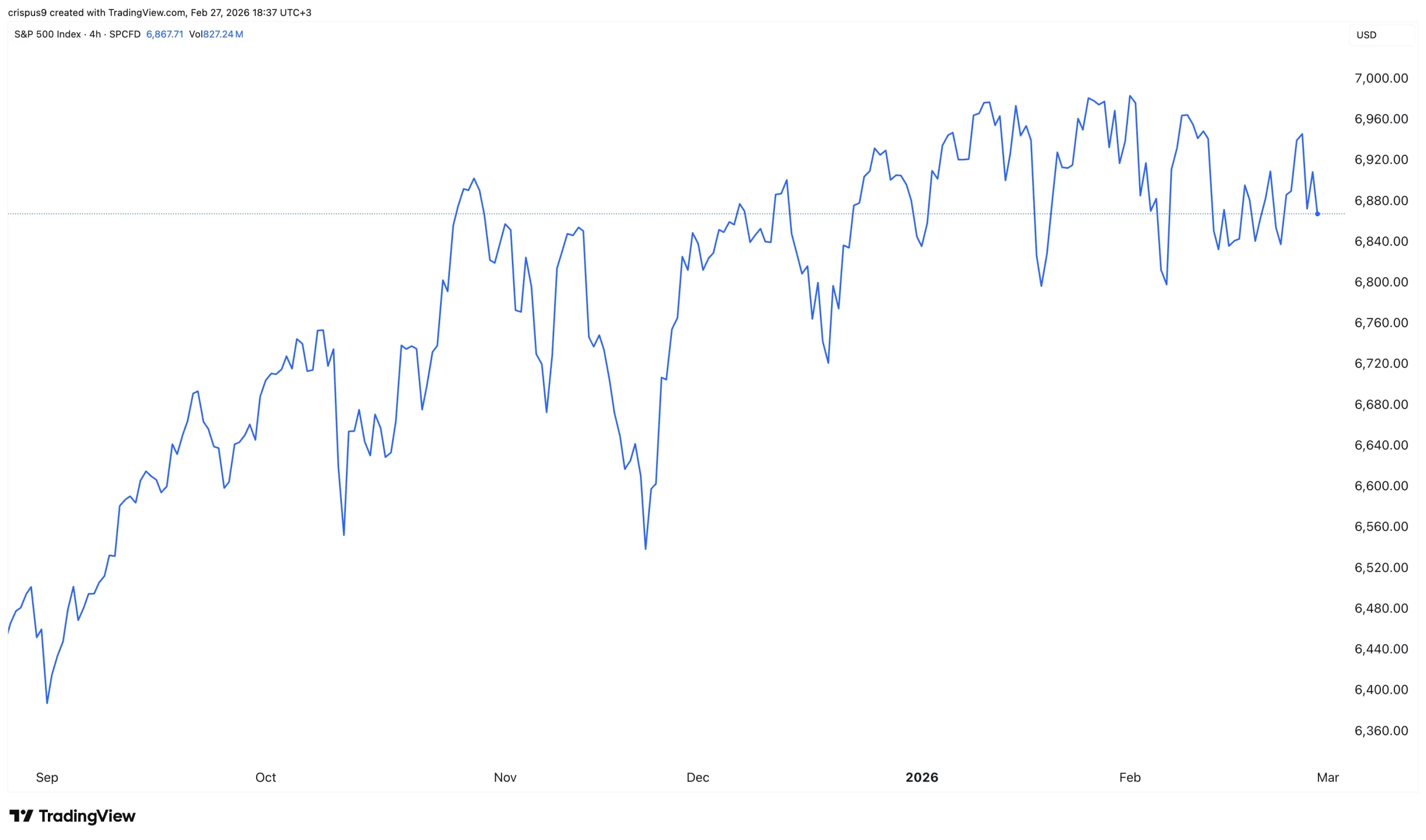
The S&P 500 Index retreated by over 0.6% on Friday, continuing a retreat that started on Thursday as market participants reacted to the latest NVIDIA earnings.
Summary
- The S&P 500 Index retreated by over 0.50% on Friday.
- Jitters in the booming private credit industry accelerated.
- The US published a strong producer price index report.
The blue-chip index, which tracks the biggest companies in the United States, dropped to $6,857, down substantially from the year-to-date high of $7,010.
Other stock indices like the Nasdaq 100, Dow Jones, and the Russell 2000 declined by over 1%.
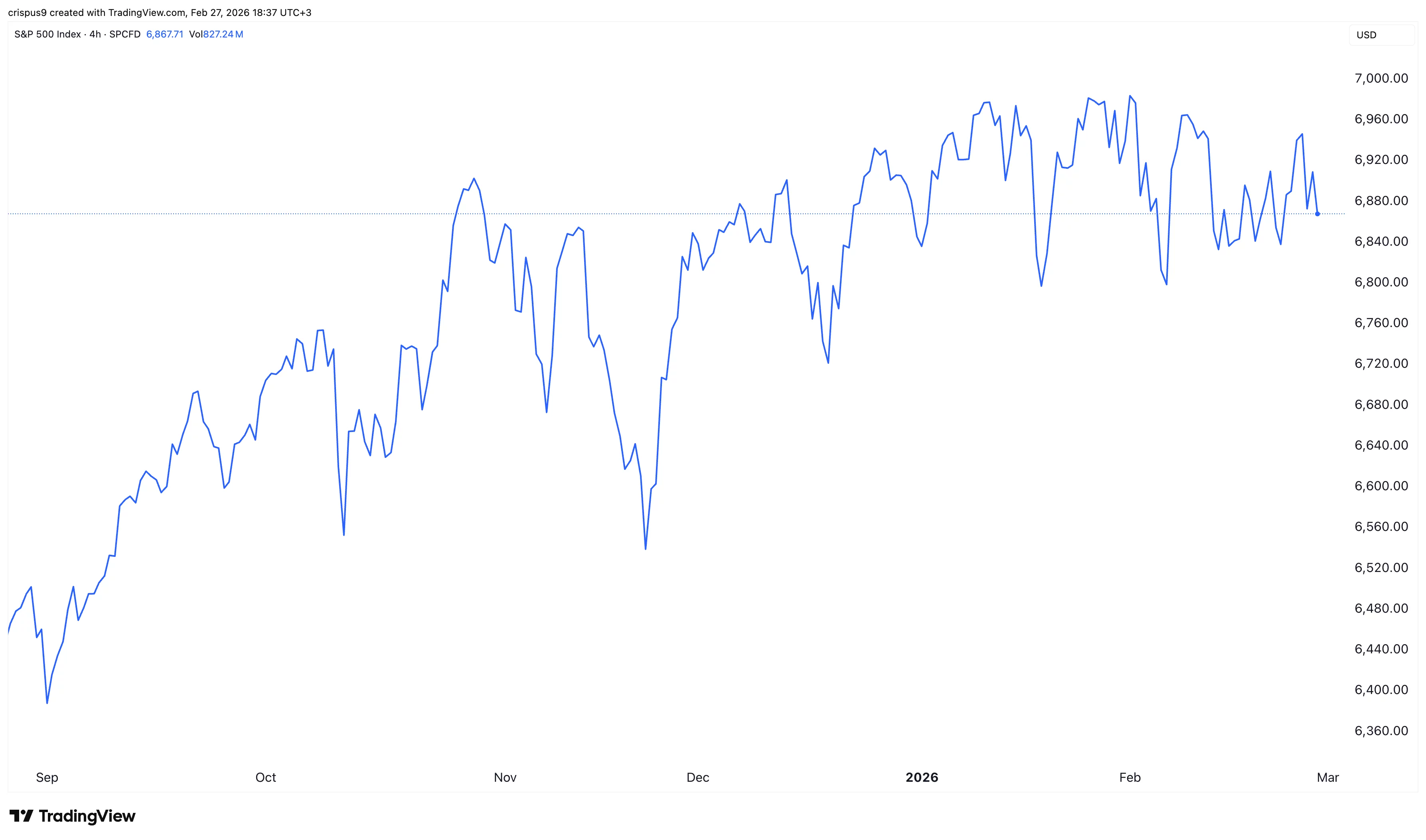
The decline happened as concerns about the $1.8 trillion private credit industry escalated. These concerns started earlier this month after Blue Owl, a company with over $300 billion in assets under management, sent shockwaves in the broader market.
Blue Owl sold a private credit portfolio and announced measures to limit redemption by its investors. This move was an escalation to what happened last year when the company attempted to merge a private and public fund.
The crisis escalated this week after a fund managed by Apollo Asset Management slashed its dividend in a bid to preserve cash as defaults rose.
As a result, top private credit and equity companies like Blue Owl, Apollo, Ares, and Blackstone continued falling. Blue Owl stock dropped by over 4.3%, bringing its three-month decline to 25%.
Apollo Global Management’s stock dropped by over 7%, while Ares fell by over 6%. Blackstone and KKR stocks also continued falling.
The S&P 500 Index also dropped as odds of a US attack on Iran jumped after Israel’s embassy asked non-essential staff to leave. As a result, airline stocks like United Airlines, Delta Airlines, and American Airlines were among the top laggards in the S&P 500 Index.
Additionally, the index retreated after the US published strong producer price index (PPI) data.
The report showed that the headline PPI rose by 2.9% in January, while the core PPI moved to 3.6%. These numbers mean that the Federal Reserve may find it difficult to cut interest rates in the coming meetings.
Crypto World
Trump Plans Cuba Takeover, Iran War Heat Drives Bitcoin Crash
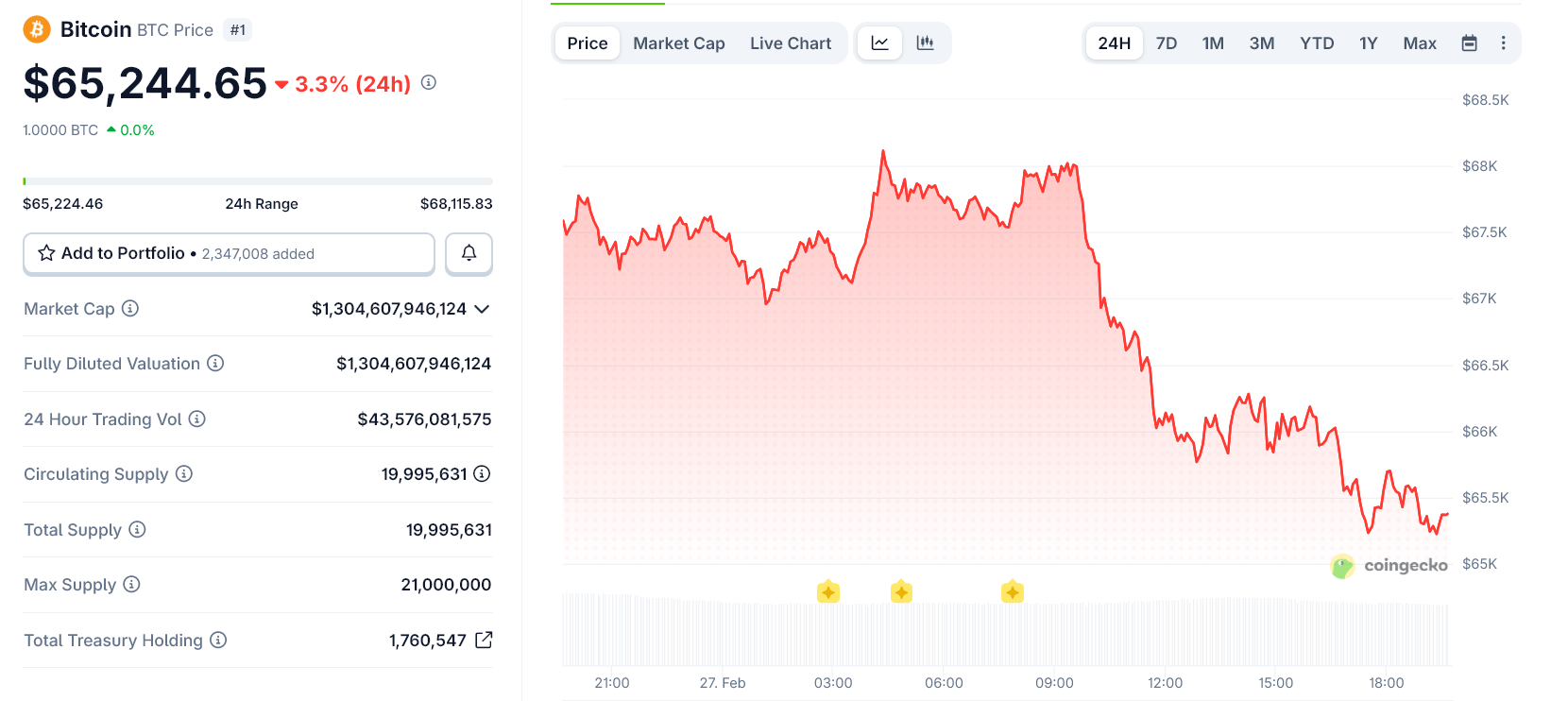
Bitcoin fell sharply on February 27 as geopolitical tensions intensified, pulling the price back to around $65,200 after several days of attempts to recover toward $70,000. The drop came as US President Donald Trump suggested the possibility of a “friendly takeover” of Cuba, while Washington simultaneously increased its military posture in Israel.
The combined headlines injected fresh uncertainty into global markets. Crypto, which had been stabilizing, reacted quickly.
Trump on Cuba: “Maybe We Will Do a Friendly Takeover”
Speaking earlier today, Trump said the Cuban government is “in big trouble” and “talking with us,” adding that the US could pursue a “friendly takeover.” He framed Cuba as financially desperate and open to negotiation.
The comment follows weeks of mounting pressure. Since returning to office in January 2025, Trump reinstated and expanded maximum pressure policies against Havana.
In late January 2026, he signed an executive order declaring a national emergency related to Cuba and threatening tariffs on any country supplying oil to the island.
That move effectively created an oil blockade. Cuba relies heavily on Venezuelan and Mexican fuel. When shipments were halted under US pressure, the island faced rolling blackouts, airport fuel shortages, and widespread economic strain.
How the Cuba Crisis Escalated
Tensions intensified further this week after a deadly maritime incident. Cuban forces intercepted a US-registered speedboat near their territorial waters. Four people were killed in the exchange.
Havana described the group as armed infiltrators. Washington denied involvement but launched investigations.
Meanwhile, Trump’s administration briefly allowed limited humanitarian oil flows through private channels.
However, the broader economic pressure remains in place.
Against this backdrop, the phrase “friendly takeover” carries weight. It likely implies a negotiated political transition under US leverage, not a military invasion.
Still, the language is sensitive. Cuba has built its identity around resisting US influence for over six decades.
US Military Build-Up in Israel
At the same time, the United States has increased its military presence in Israel amid rising tensions with Iran.
Advanced fighter jets and additional assets have been positioned in the region. The State Department also authorized the departure of non-essential diplomatic staff.
Although officials describe the posture as deterrence, markets see rising geopolitical risk. The Middle East and the Caribbean now sit under simultaneous US pressure campaigns.
Bitcoin Reacts to Global Risk
Bitcoin had been attempting to reclaim $70,000 in recent sessions. Instead, it reversed sharply, falling more than 3% in 24 hours. The move suggests traders are reducing risk exposure.
Crypto often reacts to macro uncertainty in two phases. Initially, liquidity tightens and prices drop. Later, if instability persists, some investors rotate into Bitcoin as a hedge.
For now, markets appear to be in the first phase.
With geopolitical tensions expanding on multiple fronts, volatility may remain elevated. Bitcoin’s next move will likely depend on whether diplomatic channels calm the situation — or whether escalation continues.
Crypto World
Barclays Evaluates Blockchain-based Settlement – “The Defiant”


Barclays is exploring a new platform integrating stablecoins and tokenized deposits.
Barclays is evaluating technology providers for a new platform to integrate stablecoins and tokenized deposits, according to a report from Bloomberg.
The British banking giant is exploring blockchain-based settlement systems in response to growing demand, and could pick a vendor as soon as April, according to people familiar with the matter.
Barclays’ recent activities signify a shift from its previously cautious stance to active investment in blockchain infrastructure. This change aligns with the evolving financial landscape, influenced by regulatory developments like the US GENIUS Act, which established a framework for dollar-backed tokens, and has encouraged institutions to explore blockchain and digital currencies more aggressively.
Moreover, Barclays has joined a bank-led consortium to explore a reserve-backed digital currency using public blockchain technology. This initiative focuses on G7-pegged assets to enhance cross-border settlements, as highlighted by the Financial Times.
Barclays’ potential embrace of blockchain is part of a broader trend among major financial institutions, including JPMorgan and HSBC, who are also investing in digital infrastructure. This strategic direction by Barclays underscores the growing importance of blockchain technology in traditional finance, with stablecoins playing a crucial role in future payment systems.
This article was generated with the assistance of AI workflows.
Crypto World
Bitcoin manipulation claims face pushback as ETFs reverse 5wk outflow
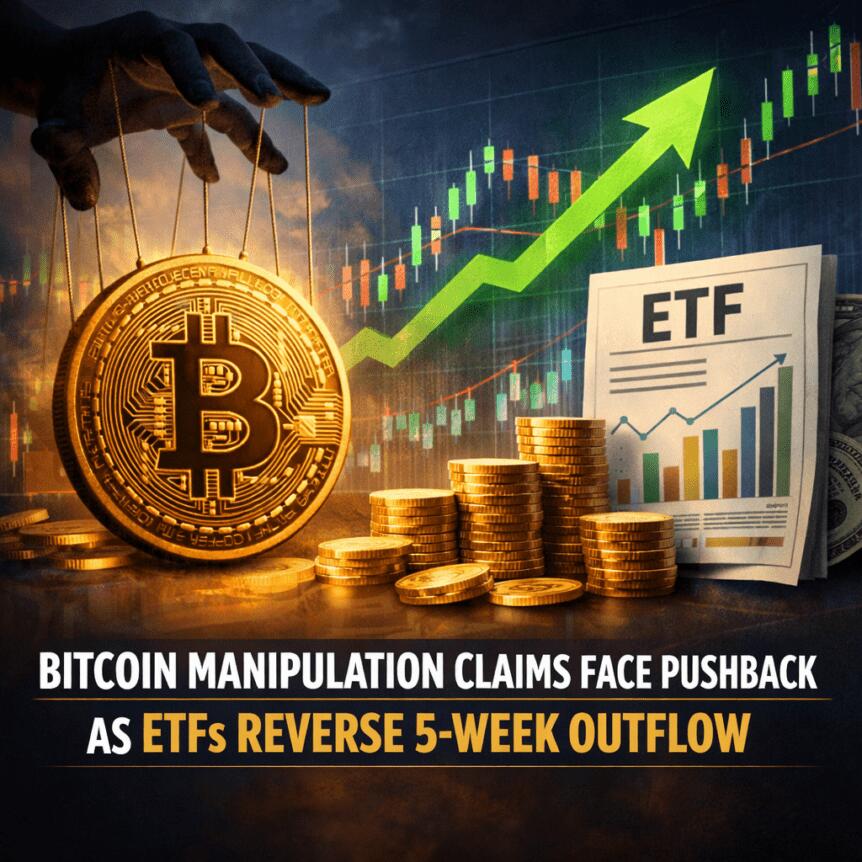
Bitcoin (CRYPTO: BTC) traded in a tight band this week as market participants weighed chatter about a purported “10 a.m. dump” tied to a prominent quantitative trading firm. The narrative gained traction after Terraform Labs’ court-appointed administrator filed a suit alleging insider trading connected to the Terra ecosystem’s May 2022 collapse. Yet data from multiple trackers points to a more diffuse market dynamic, with no single actor reliably pushing Bitcoin lower through the open, and liquidity environments shading toward ETF inflows and broader risk sentiment. On the data side, spot Bitcoin demand returned with vigor as exchange-traded products (ETPs) drew fresh capital, and institutional names continued to tilt perceptions about how crypto balance sheets are managed in a stressed environment. Ethereum (CRYPTO: ETH) has also faced its own set of pressures, including large corporate balance sheets reporting losses amid a broad downturn.
The week’s discourse extended beyond the 10 a.m. narrative. In the U.S., demand for spot Bitcoin exchange-traded funds picked up after weeks of negative flow, with several consecutive days recording inflows. Data from Farside Investors shows spot Bitcoin ETFs taking in more than $1 billion across three straight days, including $254 million on Thursday, underscoring renewed appetite among institutions and retail buyers alike. The rhythm of inflows not only suggests a stabilizing bid for Bitcoin itself but also highlights how investors are navigating the cryptoeconomy through regulated vehicles as volatility remains elevated in several corners of the market. Within this broader context, the appetite for regulated Bitcoin exposure appears to have survived the 2022–2023 era of freestanding volatility and the occasional liquidity drought that accompanied broader macro risk-off periods.
Other notable developments touched on the corporate side of Ethereum. Bitmine Immersion Technologies, a leading corporate Ether (ETH) treasury holder, appears to be sitting on a large unrealized loss, with estimates around an $8.8 billion gap between current prices and the company’s cost basis as Ether prices remained depressed. The Bitmine balance sheet illustrates how even industry participants with sizable on-chain exposure can face material impairment when token prices retreat from peaks seen in prior years. Bitmine’s holdings, tracked by third-party services, reveal an average cost basis near the mid-$3,000s per Ether, amplifying the impact of the latest price movements on the treasury’s reported economics. Despite the paper losses, Bitmine continues to accrue Ether in the portfolio, signaling a willingness to sustain a long-term stake even in a downturn environment. The broader Ether narrative continues to be shaped by ongoing network developments, regulatory scrutiny, and the evolving macro backdrop that has challenged risk assets across crypto and traditional markets.
Traders also watched notable on-chain activity linked to high-profile figures. Ethereum’s co-founder Vitalik Buterin has been unloading Ether in what he described as plans to earmark roughly $45 million worth of tokens for privacy-oriented projects. Buterin’s wallets were reported to hold about 241,000 Ether early in February but declined to roughly 224,000 ETH as selling continued into the month. On-chain data indicates the majority of the sales were routed through decentralized-exchange aggregators, such as CoW Protocol, using numerous smaller swaps rather than a single large block. These patterns are consistent with a technique used by some traders to minimize market impact when converting large holdings into other assets or currencies. The disclosures add a human dimension to a market that often abstracts price action into charts and models, reminding readers that individual actors can influence the pace of selling without necessarily altering the longer-term crypto narrative.
In parallel, the market highlighted Ethereum-related corporate dynamics in another corner of the ecosystem. Bitmine’s broader Ether exposure has remained a focal point for analysts who question whether a broader structural issue could be emerging for Ether’s investment case. The situation underscores the sensitivity of corporate treasuries to price swings in ETH and the challenges of budgeting liquidity while capital markets watch for deeper shifts in DeFi and staking economics. The broader implications for corporate treasuries are not limited to Bitmine; 10x Research and other researchers have flagged that Ether is trading around levels that test whether the downturn is cyclical or signals deeper structural issues. The market’s emphasis on cost basis and unrealized losses among large corporate holders highlights the ongoing tension between long-term holdings and near-term price weakness, a dynamic that informs decisions across institutional wallets and treasury strategies.
Meanwhile, within the DeFi sector, leading lending protocols continued to expand their scale and institutional appeal. Aave, for instance, reported crossing $1 trillion in cumulative lending volume, marking a historic milestone for on-chain finance. Aave’s leadership in the space reflects a broader push to normalize DeFi as a credible input to traditional finance, with the project emphasizing its role as a foundational liquidity network. The firm’s institutional outreach has included the launch of Aave Horizon, a dedicated lending market on Ethereum designed to enable traditional finance firms and other large investors to borrow stablecoins against real-world assets. Early participants included VanEck, WisdomTree and Securitize, signaling that established asset managers are paying attention to the potential of tokenized, on-chain liquidity. In a broader context, the DeFi sector has also pointed to the possibility of tokenizing “abundance assets”—such as solar energy and robotics—though the path to mass adoption and regulatory clarity remains a work in progress. Stani Kulechov, CEO of Aave Labs, has framed the expansion as part of a long-term strategy to connect traditional finance with a scalable on-chain liquidity network, and he has publicly discussed the potential for DeFi to underpin broader financial infrastructure in the years ahead.
Crucially, the DeFi landscape continues to contend with shifting incentives. Curve Finance founder Michael Egorov argued that DeFi must move away from token emissions as the primary engine of liquidity. In an interview with Cointelegraph, Egorov contended that protocols should generate real revenue rather than rely on inflationary token incentives, noting that the DeFi “summer” era of 2020—when triple-digit TVLs drew flows into new protocols—represented a very different market environment. He argued that token velocity and speculative premiums no longer reliably translate into price increases, pointing to a broader re-prioritization of value drivers as TVL (total value locked) has fallen and liquidity becomes more costly to obtain. Data from DefiLlama shows DeFi TVL down roughly 38% over six months, with total value locking sliding from about $158 billion to around $98 billion as of this week.
Market reaction and key details
The week’s price action and commentary reflect a market that remains highly data-driven, with inflows into spot Bitcoin ETFs providing a counterweight to volatility in altcoins and tokens linked to DeFi. The stronger ETF demand aligns with a broader willingness among investors to obtain regulated exposure to Bitcoin, even as macro sensitivities persist. At the same time, the narrative around a single actor’s influence—famously associated with a “10 a.m. dump”—has not withstood scrutiny from market observers who emphasize liquidity depth, hedging activity, and the role of delta-neutral strategies that blend spot purchases with offsetting futures. CryptoQuant’s head of research noted that the described activity is not unique to a single firm; the pattern of buying spot exposure while selling futures is a common tactic for funds seeking to capture spreads rather than directional price moves. The takeaway for traders is that short-term price dips are not reliable indicators of a concerted manipulation scheme, especially when liquidity flows and hedging strategies mask net exposure in public filings.
On the corporate front, Bitmine’s situation remains a focal point for those tracking Ether as a treasury asset. The company’s paper losses, coupled with Ether’s broader price motion, have raised questions about the economics of large, long-hold Ether portfolios and the risk management practices that accompany such holdings. While Bitmine continues to accumulate Ether, the scale of the paper loss underscores the challenge of navigating a downturn when large balance sheets are deeply underwater relative to their cost basis. The market will be watching whether Bitmine’s strategy evolves toward more cost-efficient accumulation or whether the firm takes a more cautious stance as price dynamics evolve.
From a systemic perspective, Aave’s milestones highlight the ongoing maturation of DeFi as a facet of institutional finance. Surpassing $1 trillion in cumulative lending volume is not just a numeral milestone; it signals a deeper level of trust among builders and users who rely on on-chain lending as part of a diversified liquidity strategy. The Horizon initiative mirrors a broader trend: traditional finance is increasingly engaging with regulated, permissioned paths to access decentralized liquidity. This alignment with institutions is likely to affect the headlines around DeFi, shaping capital flows and the pace at which new use cases—such as tokenized real-world assets—are tested in real markets. Meanwhile, Curve’s call for revenue-driven models presents a practical pivot for protocols developed during periods of token-driven growth, a shift that market participants must evaluate against ongoing competition for liquidity and funding in a tightening environment.
Why it matters
For investors, the week’s events underscore a composite picture: Bitcoin’s regulatory-friendly exposure through ETFs is expanding, while the DeFi ecosystem is increasingly defined by revenue-generating models rather than pure token incentives. This implies a potential recalibration of risk premiums and valuation frameworks as regulated products coexist with on-chain liquidity that is maturing toward more robust, revenue-backed business models.
For builders and developers, the emphasis on real revenue streams signals a shift in product design. Protocols may prioritize sustainable fee structures, cross-chain interoperability, and institutional-grade risk controls to appeal to larger asset managers and banks. The Aave Horizon launch illustrates how regulated channels can complement permissionless finance, enabling institutions to access liquidity in familiar formats while preserving the transparency and programmability that define DeFi at its core.
For corporate treasuries and risk managers, the discussion around cost basis and unrealized losses in Ether highlights the dual challenge of balancing long-term exposure with the need to monitor liquidity and price volatility. The Bitmine case, in particular, emphasizes the potential for material impairment in treasury-heavy strategies if market conditions deteriorate further. The unfolding dynamic raises questions about optimal hedging configurations, diversification across assets, and whether to pursue more active risk management in periods of extended drawdowns.
What to watch next
- Continuing ETF inflows: Watch Farside data for the next three weeks to confirm whether the momentum in spot Bitcoin ETFs persists.
- Terraform/Jane Street developments: Monitor the ongoing legal actions and any new filings related to insider-trading allegations and market impact.
- Bitmine updates: Track Bitmine’s quarterly disclosures and any changes in their Ether balance strategy or cost-basis metrics.
- Aave Horizon uptake: Observe institutional participation and any new assets added to on-chain lending markets, plus regulatory updates affecting DeFi lending.
Sources & verification
- Terraform Labs administrator filing alleging insider trading tied to Terra’s collapse (legal filing / court documents).
- Farside Investors data on US-listed spot Bitcoin ETF inflows, including the $254 million on Thursday.
- Bitmine Immersion Technologies’ Ether treasury data and reported unrealized losses (Bitminetracker / on-chain analytics).
- Vitalik Buterin’s ETH balance trajectory and on-chain sale activity (Arkham data; Lookonchain lookups).
- Aave’s cumulative lending volume milestone and information on Aave Horizon’s institutional program (Aave communications / official updates).
Market reaction and key details
Bitcoin (CRYPTO: BTC) showed resilience in the face of speculation about manipulated moves at market open, with analysts noting that a tissue of hedges and delta-neutral strategies can obscure the true net exposure of large traders. The broader takeaway is that the market did not exhibit a durable, company-driven selloff that could sustain a prolonged downturn. In parallel, the inflows into spot Bitcoin ETFs—backed by data from Farside Investors—illustrate renewed demand for regulated vehicles that offer exposure to the flagship asset without requiring direct custody of coins. This demand appears to be supported by a mix of retail and institutional investors who seek the safety net of regulated products in times of cross-asset volatility. The IBIT exposure—iShares Bitcoin Trust—in particular has been a focal point for discussions about how institutions implement regulated exposure to Bitcoin, though the specifics of holdings and hedges remain part of ongoing disclosure and market interpretation.
Ethereum’s corporate dynamics continued to weigh on Ether’s price narrative. Bitmine Immersion Technologies—one of the largest corporate Ether treasuries—faces what analysts describe as a substantial paper loss, reflecting how fast-moving price action can widen gaps between market price and cost basis for large holders. The situation adds a layer of complexity to the broader ETH story, where on-chain use cases, staking economics, and regulatory considerations converge to shape long-run demand and supply. Buterin’s recent activity—selling portions of ETH to fund privacy initiatives—also underscores how even celebrated crypto figures navigate the tension between philanthropic or strategic goals and the practical realities of balance sheet management in a down market. The execution path—routing sales through CoW Protocol to avoid market impact—also highlights the sophistication of modern on-chain trading tactics and their implications for liquidity and price formation.
On the DeFi front, the milestone of surpassing $1 trillion in cumulative lending volume for Aave marks a watershed moment. It signals that the sector is increasingly viewed as a mature and scalable component of a diversified crypto finance stack. Aave Horizon’s launch, designed to attract institutional capital to real-world asset-backed lending against stablecoins, suggests a deliberate bridging of on-chain and off-chain opportunities. The focus on tangible revenue generation—rather than token emissions—reflects a broader industry shift toward sustainability and governance-driven growth, a theme echoed by Curve Finance founder Michael Egorov, who argues for a move away from inflationary incentives toward revenue-backed models. The DeFi ecosystem’s TVL decline—down about 38% over the last six months to roughly $98 billion—serves as a cautionary backdrop, reminding readers that liquidity, regulatory clarity, and the cost of capital continue to shape expectations for long-term growth.
Why it matters
For traders and investors, the week’s data emphasizes that regulated exposure and on-chain liquidity are not mutually exclusive trends. ETFs and regulated products continue to draw capital into Bitcoin, while the DeFi ecosystem demonstrates resilience through major milestones and institutional collaborations. This duality suggests that crypto markets may be entering a phase where traditional financial instruments and decentralized finance operate in closer harmony, each contributing to a more nuanced risk-adjusted landscape.
For developers and ecosystem builders, the shift toward revenue-driven models signals a need to retool incentive structures and monetize real-world utility. Projects that align fees, services, and governance with measurable revenue streams could gain greater legitimacy in the eyes of institutions and auditors. This transition is likely to shape product roadmaps, fundraising strategies, and regulatory conversations as the industry continues its evolution toward a more mature financial stack.
What to watch next
- Next round of ETF inflows and potential shifts in spot BTC demand (watch Farside data and ETF issuer updates).
- Regulatory and legal developments around Terraform Labs and Jane Street; any new allegations or disclosures could influence market sentiment.
- Bitmine’s continued Ether balance management and cost-basis updates; monitor any changes in treasury strategy.
- Institutional uptake of Aave Horizon and broader DeFi adoption signals, including new asset types and asset-backed lending markets.
-

 Politics6 days ago
Politics6 days agoBaftas 2026: Awards Nominations, Presenters And Performers
-

 Sports4 days ago
Sports4 days agoWomen’s college basketball rankings: Iowa reenters top 10, Auriemma makes history
-

 Politics4 days ago
Politics4 days agoNick Reiner Enters Plea In Deaths Of Parents Rob And Michele
-

 Business3 days ago
Business3 days agoTrue Citrus debuts functional drink mix collection
-

 Politics21 hours ago
Politics21 hours agoITV enters Gaza with IDF amid ongoing genocide
-
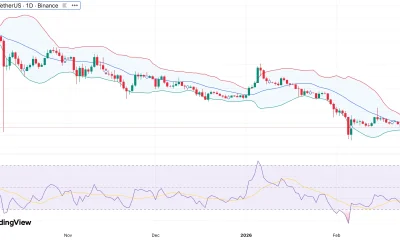
 Crypto World4 days ago
Crypto World4 days agoXRP price enters “dead zone” as Binance leverage hits lows
-

 Business5 days ago
Business5 days agoMattel’s American Girl brand turns 40, dolls enter a new era
-

 Business5 days ago
Business5 days agoLaw enforcement kills armed man seeking to enter Trump’s Mar-a-Lago resort, officials say
-

 NewsBeat2 days ago
NewsBeat2 days agoManchester Central Mosque issues statement as it imposes new measures ‘with immediate effect’ after armed men enter
-

 NewsBeat2 days ago
NewsBeat2 days agoCuba says its forces have killed four on US-registered speedboat | World News
-

 Tech3 days ago
Tech3 days agoUnsurprisingly, Apple's board gets what it wants in 2026 shareholder meeting
-

 NewsBeat4 days ago
NewsBeat4 days ago‘Hourly’ method from gastroenterologist ‘helps reduce air travel bloating’
-

 Tech5 days ago
Tech5 days agoAnthropic-Backed Group Enters NY-12 AI PAC Fight
-

 NewsBeat5 days ago
NewsBeat5 days agoArmed man killed after entering secure perimeter of Mar-a-Lago, Secret Service says
-

 Politics5 days ago
Politics5 days agoMaine has a long track record of electing moderates. Enter Graham Platner.
-

 Business2 days ago
Business2 days agoDiscord Pushes Implementation of Global Age Checks to Second Half of 2026
-

 NewsBeat3 days ago
NewsBeat3 days agoPolice latest as search for missing woman enters day nine
-
Sports4 days ago
2026 NFL mock draft: WRs fly off the board in first round entering combine week
-

 Business1 day ago
Business1 day agoOnly 4% of women globally reside in countries that offer almost complete legal equality
-

 Crypto World3 days ago
Crypto World3 days agoEntering new markets without increasing payment costs




















